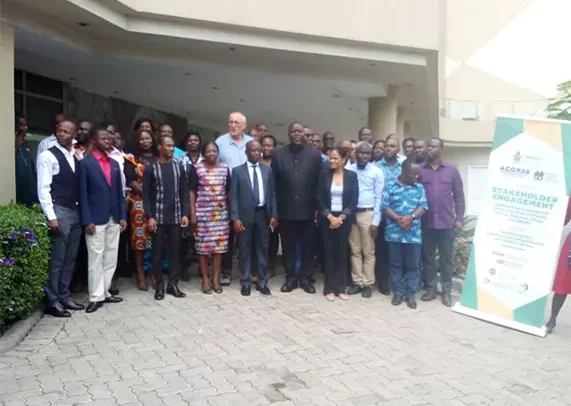Dr. Daniel Boateng (M) and Prof. Francis Zotor with other officials at the launch
The Kwame Nkrumah University of Science and Technology (KNUST), in collaboration with the National Institute of Health Research (NIHR), UK, launched the Addressing Commercial Determinants of Health in Sub-Saharan Africa (ACORDS) project on July 29, 2025, in Accra.
The ACORDS project aims to explore the impact of three Unhealthy Commodity Industries (UCIs), namely alcohol, ultra-processed food, and fossil fuels, on population health in Sub-Saharan Africa (SSA), and to inform the development of coherent policies that promote health and sustainable development in the region.
The Vice President of the International Union of Nutritional Sciences, Prof. Francis Zotor, expressed concern over the surge in Non-Communicable Diseases (NCDs) in Sub-Saharan Africa due to the steady rise in the manufacture and distribution of unhealthy products such as alcohol, tobacco and fossil fuels. He also highlighted the negative effects of illegal mining on the citizenry.
”Galamsey is killing us. Our foods are riddled with various heavy metals. Not only that, even the fish cannot stay in the waters where they belong, because the waters have been muddied. Why would small gold cause things that are supposed to bring us good health to be affected?” he quizzed.
Prof. Zortor recommended that harmful practices such as illegal mining be banned, stressing that individuals should be mindful of the foods they consume.
A team member for ACORDS Ghana, Dr. Daniel Boateng, explained that though a policy implementer, the government will not be able to rid the nation of this canker, but would take collective efforts from various stakeholders.
He also disclosed that conflict of interest often prevents the creation and implementation of policies, as these industries often fund government projects, and added that an avenue should be found to remove these conflicts to allow for the creation of policies.
”The government acts as a policy implementer but faces challenges, as it cannot do this alone. I propose collaboration, since these industries (alcohol, ultra-processed food, and fossil fuels) have long-standing expertise in their roles. Research highlights a conflict of interest, as individuals involved are also part of the policy creation process. Until these conflicts are addressed, they will likely continue to prioritise certain interests of theirs,” he explained.
On behalf of the Minister of Health, Kwabena Mintah Akandoh, the Chief Director of the Ministry of Health, Desmond Boateng, disclosed that the Ministry of Health has established an inter-sectoral collaboration team to enhance health, digital integration, and coordinate cross-sectoral efforts.
He also reaffirmed the ministry’s commitment to improving the health and well-being of individuals. He added that the Ministry of Health is ready to support the project and to investigate the impact of commercial interests on population health in Ghana and Sub-Saharan Africa.
The project will be conducted in South Africa, Ghana, and Kenya, addressing national priorities and promoting South-South learning. It aims to enable innovative comparative studies across industries, policy spheres, and country contexts, extending the scope of commercial determinants of health research geographically, empirically, and analytically.
By Vera Owusu Sarpong


